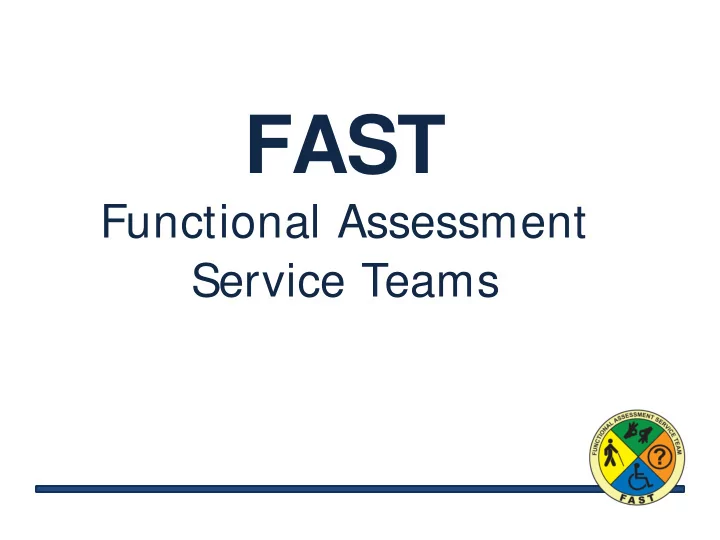

FAST Functional Assessment Service Teams
Part of FEMA’s ‘ Whole Community Philosophy ’ Except for people who are medically fragile, all people should be able to stay in general shelters during emergencies and disasters.
A Brief History of FAST…
The FAST concept started in 2006, involving these departments and organizations in California:
54 Million Americans with disabilities (About one in five) Source: 2010 U.S. Census Bureau; all categories not mutually exclusive; persons may also have more than one disability. 5
Hurricane Katrina in 2006 According to CBS News, following Katrina, of those who stayed behind: 38% did not evacuate because they had a disability, or were caring for individuals with a disability.
Katrina was a wake up call • People with different disabilities did (and will) show up at shelters during disasters. • DEM has lead responsibility for coordinating at the local level.
People with access and functional needs Five categories of functional needs under FEMA’s definition (C-MIST): 1. Communication 2. Medical 3. Independence 4. Supervisory 5. Transportation
Key concepts behind FAST People with access and functional needs can be accommodated in general population shelters if given the proper support.
Key concepts behind FAST Meeting the needs of people with access and functional needs requires proper planning done pre-incident and coordination done during an incident.
Complement to Personal Preparedness The FAST program does not relieve the person with access and functional needs from personally preparing for disasters • All individuals should have an evacuation plan • All individuals should have an out-of-area contact • All individuals should put together an emergency kit, which includes personal items such as hearing aids, wheelchair tools, medications, etc.
Key concepts behind FAST Support for sheltering people with access and functional needs comes from the community - government, non-governmental organizations, faith based organizations and private resources.
FAST Philosophy •FAST will help assess people with access and functional needs and assist them by helping them get what they need to stay in a general population shelter •FAST will help distinguish people who have access and functional needs from those who have medical needs.
FAST description and duties • Trained government employees and private non- profit personnel, and volunteers • Deployed as shelters open and may work until no longer needed • May serve several shelters and could also work in Disaster Recovery Centers • In-depth knowledge of populations they serve, their cultures, and service networks.
FAST qualifications • Have at least two years’ experience working with specific populations • Complete the FAST training and certification • Pass a background check • Work under difficult and stressful situations
FAST experience Members should have a combined experience working with people who have/are: • Mental health needs • Developmental and other cognitive disabilities • Low vision/blindness • Deaf/hard of hearing • Aging • Chemical dependencies • Physical health conditions (nursing support services) • Physical disabilities • Cultural/religious needs • Communication barriers
FAST duties Teams will work in coordination with shelter managers to conduct assessments of individuals and arrange for accommodations by requesting resources such as: • Durable medical equipment (DME) • Consumable medical supplies (CMS) • Essential medications • Communication access • Personal Assistants (PAs)
FAST training • Length: 16 hours over two consecutive days • Number of participants for each session: target is 40 • Trainers represent a variety of disciplines • Modeled after Department of Homeland Security- approved program
2011/12 FAST Pilot Project Pierce County Partners •Pierce County Emergency Management •Hearing Speech and Deafness Center •Pierce County Community Connections •Helping Hand House •Tacoma Area Coalition for Individuals •Northwest Center for Independent Living with Disabilities (TACID) •OptumHealth •American Red Cross, Mount Rainier •Tacoma Goodwill Industries Chapter •Tacoma Pierce County Health •Associated Ministries Department •Center for Independence •U.S. Health and Human Services, •CS Hard of Hearing Resource Specialist Children and Family Services •City of Lakewood •Washington State Dept. of Social and •City of Tacoma Health Services •Federal Emergency Management Agency Region X
Establishing FAST in Pierce County • Pierce County Department of Emergency Management is taking the lead. • Planning group is a coordinated effort between community partners • Natural next step for the High Risk Populations Disaster Planning Coalition that began in 2007
For more information: Pierce County Department of Emergency Management Sheri Badger (253) 798-2204 ~ office sbadger@co.pierce.wa.us
Recommend
More recommend